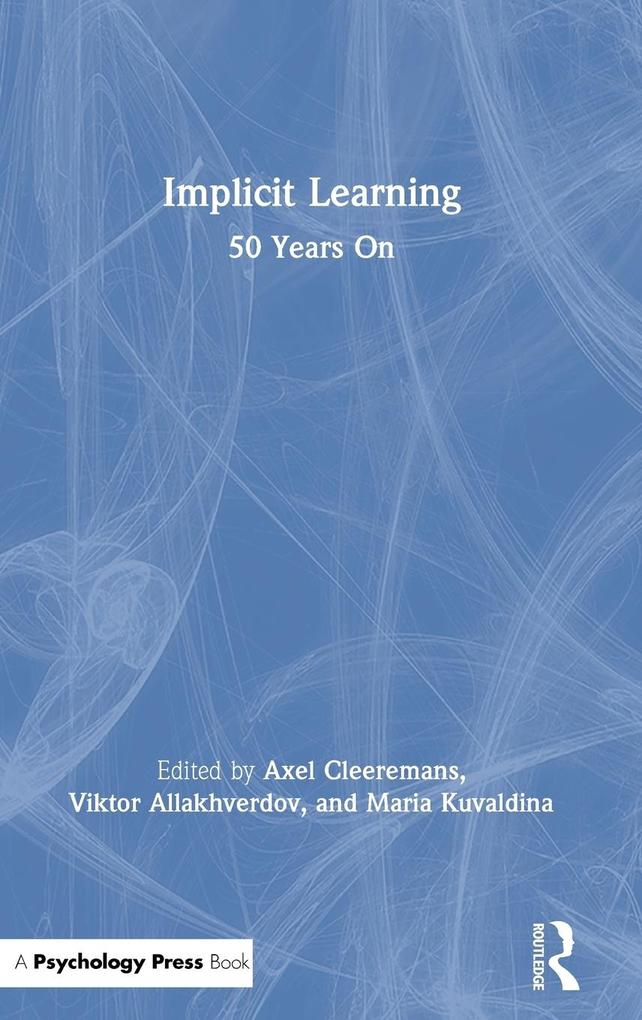
Zustellung: Fr, 22.08. - Di, 26.08.
Versand in 7 Tagen
VersandkostenfreiBestellen & in Filiale abholen:
Can we learn without knowing we are learning? To what extent is our behavior influenced by things we fail to perceive? What is the relationship between conscious and unconscious cognition? Implicit Learning: 50 Years On tackles these key questions, fifty years after the publication of Arthur Reber's seminal text.
Inhaltsverzeichnis
Chapter 1: Implicit learning: history and applications. Paul J. Reber, Laura J. Batterink, Kelsey R. Thompson, and Ben Reuveni
Chapter 2: The mind is deep. Axel Cleeremans
Chapter 3: Consciousness, learning, and control: on the path to a theory. Victor M. Allakhverdov, Margarita G. Filippova, Valeria A. Gershkovich, Valeriia Yu. Karpinskaia, Tanya V. Scott, and Natalia P. Vladykina
Chapter 4: Implicit learning from one's mistakes: the negative choice aftereffect. Maria Kuvaldina, Andrey A.Chetverikov, Alexandr S. Odaynic, Margarita G. Filippova, and Natalya V. Andriyanova
Chapter 5: Can we play Space Invaders unconsciously? (A: probably not). Estibaliz San Anton, Axel Cleeremans, and Arnaud Destrebecqz
Chapter 6: Can unconscious structural knowledge be strategically controlled? Elisabeth Norman, Ryan B. Scott, Mark C. Price, Emma Jones, and Zoltan Dienes
Chapter 7: Abstraction in sequence learning. Ferenc Kemény and Ágnes Lukács
Chapter 8: The verbalization effect on implicit learning. Nadezhda V. Moroshkina, Ivan I. Ivanchei, Anatolii D. Karpov and Irina Ovchinnikova
Chapter 9: Focusing on goal relevance - is it crucial to artificial grammar learning? Agnieszka Pop awska-Boruc, Rados aw Sterczy ski, and Marta Roczniewska
Chapter 10: Implicit learning under attentional load. Michä Wierzcho and Monika Derda
Chapter 2: The mind is deep. Axel Cleeremans
Chapter 3: Consciousness, learning, and control: on the path to a theory. Victor M. Allakhverdov, Margarita G. Filippova, Valeria A. Gershkovich, Valeriia Yu. Karpinskaia, Tanya V. Scott, and Natalia P. Vladykina
Chapter 4: Implicit learning from one's mistakes: the negative choice aftereffect. Maria Kuvaldina, Andrey A.Chetverikov, Alexandr S. Odaynic, Margarita G. Filippova, and Natalya V. Andriyanova
Chapter 5: Can we play Space Invaders unconsciously? (A: probably not). Estibaliz San Anton, Axel Cleeremans, and Arnaud Destrebecqz
Chapter 6: Can unconscious structural knowledge be strategically controlled? Elisabeth Norman, Ryan B. Scott, Mark C. Price, Emma Jones, and Zoltan Dienes
Chapter 7: Abstraction in sequence learning. Ferenc Kemény and Ágnes Lukács
Chapter 8: The verbalization effect on implicit learning. Nadezhda V. Moroshkina, Ivan I. Ivanchei, Anatolii D. Karpov and Irina Ovchinnikova
Chapter 9: Focusing on goal relevance - is it crucial to artificial grammar learning? Agnieszka Pop awska-Boruc, Rados aw Sterczy ski, and Marta Roczniewska
Chapter 10: Implicit learning under attentional load. Michä Wierzcho and Monika Derda
Produktdetails
Erscheinungsdatum
02. April 2019
Sprache
englisch
Untertitel
50 Years On.
Sprache: Englisch.
Seitenanzahl
278
Herausgegeben von
Axel Cleeremans, Viktor Allakhverdov, Maria Kuvaldina
Verlag/Hersteller
Produktart
gebunden
Gewicht
584 g
Größe (L/B/H)
240/161/20 mm
ISBN
9781138644298
Entdecken Sie mehr
Bewertungen
0 Bewertungen
Es wurden noch keine Bewertungen abgegeben. Schreiben Sie die erste Bewertung zu "Implicit Learning" und helfen Sie damit anderen bei der Kaufentscheidung.










